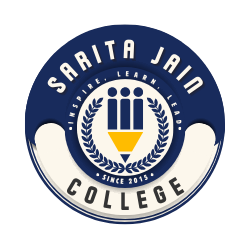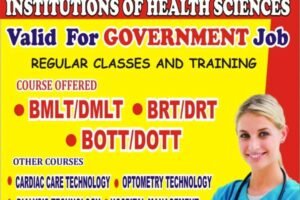Innovative Teaching Methods at Sarita Jain Paramedical College: A Deep Dive
In today’s rapidly evolving educational landscape, the effectiveness of teaching methods can significantly impact student outcomes and professional preparedness. Sarita Jain Paramedical College, a leader in healthcare education, is renowned for its commitment to innovative teaching practices. By integrating cutting-edge techniques and technology into its curriculum, the college ensures that students are not only well-versed in theory but also proficient in practical applications. This article explores the innovative teaching methods employed at Sarita Jain Paramedical College and how they contribute to shaping the future of healthcare professionals.

The Commitment to Innovation
Sarita Jain Paramedical College stands out for its dedication to adopting innovative teaching methods that enhance learning and prepare students for the dynamic healthcare industry. With a mission to “Learn with Passion to Live with Purpose,” the college integrates modern educational tools and approaches to deliver a comprehensive learning experience. The college’s teaching strategies are designed to foster critical thinking, practical skills, and adaptability, ensuring that students are equipped to meet the challenges of the healthcare sector.
Blended Learning: Combining Online and In-Person Education
One of the key innovative teaching methods at Sarita Jain Paramedical College is blended learning. This approach combines traditional classroom instruction with online learning components, providing students with a flexible and interactive educational experience.
1. Online Modules and E-Learning Resources:
The college utilizes online modules and e-learning platforms to deliver theoretical content. Students access digital resources, such as video lectures, interactive quizzes, and comprehensive reading materials, which complement their in-class learning. This method allows students to learn at their own pace and revisit complex topics as needed.
2. Interactive Virtual Classrooms:
Virtual classrooms facilitate real-time interaction between students and instructors, enabling discussions, Q&A sessions, and collaborative projects. This method enhances student engagement and provides opportunities for remote learning, making education more accessible and adaptable to various needs.
Simulation-Based Learning: Bridging Theory and Practice
Simulation-based learning is another cornerstone of the innovative teaching methods at Sarita Jain Paramedical College. By creating realistic scenarios and environments, the college provides students with hands-on experience that bridges the gap between theoretical knowledge and practical application.
1. Advanced Simulation Labs:
The college’s simulation labs are equipped with state-of-the-art technology, including mannequins, medical simulators, and virtual reality (VR) tools. These labs simulate real-world medical situations, allowing students to practice skills such as patient assessment, emergency response, and surgical procedures in a controlled setting.
2. Scenario-Based Training:
Scenario-based training involves presenting students with realistic case studies and clinical scenarios. This method encourages problem-solving and critical thinking, as students must apply their knowledge to diagnose and treat virtual patients. This approach helps develop clinical judgment and decision-making skills, essential for success in healthcare roles.
Experiential Learning: Hands-On Experience in Real-World Settings
Experiential learning is a pivotal component of the educational approach at Sarita Jain Paramedical College. By immersing students in real-world healthcare settings, the college ensures that they gain practical experience and develop the skills necessary for their future careers.
1. Clinical Rotations and Internships:
Students participate in clinical rotations and internships at affiliated hospitals, clinics, and healthcare facilities. These experiences provide valuable exposure to various medical environments and allow students to work alongside experienced professionals. Clinical rotations help students apply theoretical knowledge in practical settings, enhancing their competence and confidence.
2. Community Health Projects:
The college also emphasizes community health projects, where students engage in outreach programs and health awareness campaigns. These projects offer practical experience in public health and patient education, fostering a deeper understanding of healthcare issues and the importance of community involvement.
Interactive Learning Tools: Engaging Students Through Technology
Sarita Jain Paramedical College leverages a range of interactive learning tools to engage students and enhance their educational experience. These tools facilitate active learning and make complex concepts more accessible.
1. Augmented Reality (AR) and Virtual Reality (VR):
AR and VR technologies are used to create immersive learning experiences. For example, VR simulations allow students to explore anatomical structures, surgical procedures, and medical scenarios in a 3D environment. This hands-on approach enhances understanding and retention of complex concepts.
2. Gamification:
Gamification incorporates game-like elements into the learning process to motivate and engage students. Educational games, simulations, and interactive quizzes are used to reinforce key concepts and assess student progress. Gamification makes learning more enjoyable and encourages active participation.
Collaborative Learning: Building Teamwork and Communication Skills
Collaborative learning is a fundamental aspect of the educational philosophy at Sarita Jain Paramedical College. By working together on projects and assignments, students develop teamwork and communication skills that are essential for success in healthcare settings.
1. Group Projects and Case Studies:
Students are often assigned group projects and case studies that require collaborative problem-solving and critical analysis. These activities encourage students to share knowledge, discuss ideas, and work together to develop solutions. Collaborative learning fosters a sense of community and prepares students for the collaborative nature of healthcare work.
2. Peer Learning and Mentorship:
The college promotes peer learning and mentorship, where students support and learn from one another. Senior students often mentor juniors, sharing their experiences and insights. This approach enhances the learning experience and builds a supportive academic community.
Assessment and Feedback: Continuous Improvement and Growth
Effective assessment and feedback mechanisms are integral to the innovative teaching methods at Sarita Jain Paramedical College. These processes help monitor student progress, identify areas for improvement, and guide learning strategies.
1. Formative Assessments:
Formative assessments, such as quizzes, practical exams, and simulations, provide ongoing feedback to students. These assessments help students gauge their understanding of the material and identify areas that need further attention. Formative assessments encourage continuous learning and improvement.
2. Reflective Practices:
Students are encouraged to engage in reflective practices, where they analyze their learning experiences and outcomes. Reflective journals and self-assessment activities help students identify their strengths and areas for growth, fostering a culture of self-improvement and lifelong learning.
Conclusion
Sarita Jain Paramedical College’s commitment to innovative teaching methods sets it apart as a leader in healthcare education. By integrating blended learning, simulation-based training, experiential learning, interactive tools, collaborative approaches, and effective assessment practices, the college provides a comprehensive and dynamic educational experience.

